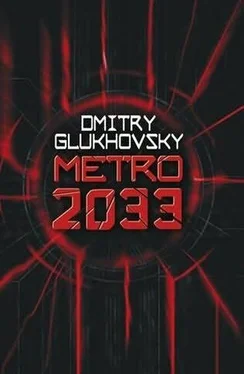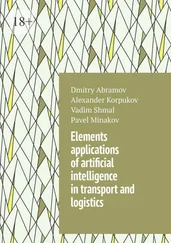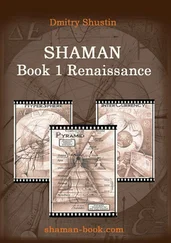But luckily, there was something at Savyolovskaya that would save them, the station and perhaps the entire Serpukhovsko-Timiryazevskaya branch. They were nearly at the station, soaked in sweat, shouting at the Savyolovskaya guards about their narrow escape from death. Meanwhile, the guards at the post were quickly pulling the cover off of some kind of impressive-looking piece of kit.
It was a flame-thrower, assembled by the local craftsmen from spare parts – homemade, but incredibly powerful. When the first ranks of rats became visible, gathering force, and you could hear the rustling and the scratching of a thousand rats’ paws from the darkness, the guards fired up the flame-thrower. And they didn’t turn it off until the fuel was spent. A howling orange flame filled the tunnel for tens of metres and burned the rats, burned them all, without stopping, for ten, fifteen, twenty minutes. The tunnel was filled with the repulsive stench of burnt flesh and the wild screeching of rats. And behind the guards of Savyolovskaya, who had become heroes and had earned fame along the entire metro line, the trolley came to a stop, cooling down. On it were the five men who had fled from Timiryazevskaya station, and there was one more – the child they had saved. A boy. Artyom.
The rats retreated. Their blind will had been broken by one of the last inventions of human military genius. Humans had always been better at killing than any other living thing.
The rats flowed backwards and returned to their enormous kingdom, whose true dimensions were known to no one. All of these labyrinths, lying at incredible depth, were so mysterious and, it seemed, completely useless for the functioning of the metro. It was hard to believe, despite the assurances of various persons of authority on the matter, that all of this was built by ordinary metro-builders.
One such person of authority had once worked as a conductor’s assistant on an electric train in the old days. There were hardly any of his kind left and they were greatly valued, because at first they had proven to be the only ones who could find their way around. And they didn’t give in to fear the moment they found themselves outside the comfortable and safe capsules of the train, in the dark tunnels of the Moscow metro, in these stone bowels of the great metropolis. Everyone at the station treated the conductor’s assistant with respect, and taught their children to do the same; it was for that reason, probably, that Artyom had remembered him, remembered him all his life: a thin, haggard man, emaciated by the long years of work underground who wore a threadbare and faded metro employee uniform that had long ago lost its chic but that he donned with the same pride a retired admiral would feel when putting on his parade uniform. Even Artyom, still just a kid at that time, had seen a certain dignity and power in the sickly figure of the conductor’s assistant…
Of course he did. For all those who survived, the employees of the metro were like local guides to scientific expeditions in the jungles. They were religiously believed, they were depended upon completely, and the survival of everyone else depended on their knowledge and skill. Many of them became the heads of stations when the united system of government disintegrated, and the metro was transformed from a complex object of civil defence, a huge fallout shelter, into a multitude of stations unconnected by a single power, and was plunged into chaos and anarchy. The stations became independent and self-sufficient, distinctive dwarf states, with their own ideologies and regimes, their own leaders and armies. They warred against each other, they joined to form federations and confederations. They became metropolitan centres of rising empire one day, only to be subjugated and colonized the next, by their erstwhile friends or slaves. They formed short-term unions against a common threat, only to fall at each other’s throats again with renewed energy the moment that threat had passed. They scrapped over everything with total abandon: over living spaces, over food – over the plantings of albuminous yeast, the crops of mushrooms that didn’t require any sunlight, the chicken coops and pig-farms, where pale subterranean pigs and emaciated chicks were raised on colourless underground mushrooms. They fought, of course, over water – that is, over filters. Barbarians, who didn’t know how to repair filtration systems that had fallen into disuse, and were dying from water that was poisoned by radiation, threw themselves with animal rage upon the bastions of civilized life, at the stations where the dynamo-machines and small home-made hydroelectric stations functioned correctly, where filters were repaired and cleaned regularly, where, tended by the caring female hands, the damp ground was punctuated with the little white caps of champignons, and well-fed pigs grunted in their pens.
They were driven forward, in their endless and desperate onslaught, by an instinct for self-preservation, and by that eternal revolutionary principle: conquer and divide. The defenders of successful stations, organized into battle-ready divisions by former military professionals, stood up to the assaults of vandals, to the very last drop of their blood. They went on to launch counter-attacks and won back every metre of the inter-station tunnels with a fight. The stations amassed their military power in order to answer any incursions with punitive expeditions; in order to push their civilized neighbours from territory that was important for sustaining life, if they hadn’t managed to attain these agreements by peaceful means; and in order to offer resistance to the crap that was climbing out of every hole and tunnel. These were strange, freakish, and dangerous creatures, the likes of which might well have brought Darwin himself to despair with their obvious lack of conformity to the laws of evolutionary development. As much as these beasts might differ from the animals humans were used to, and whether they had been reborn under the invisible and ruinous rays of sunlight, turned from inoffensive representatives of urban fauna into the spawn of hell, or whether they had always dwelled in the depths, only now to be disturbed by man – still, they were an evident part of life on earth. Disfigured, perverted – but a part of life here all the same. And they remained subject to that very same driving impulse known to every organic thing on this planet.
Survive. Survive at any cost.
Artyom accepted a white, enamelled cup, in which some of their homemade station tea was splashing around. Of course, it wasn’t really tea at all, but an infusion of dried mushrooms and other additives. Real tea was a rarity. They rationed it and drank it only at major holidays, and it fetched a price dozens of times higher than the price of the mushroom infusion. Nevertheless, they liked their own station brew and were even proud enough of it to call it ‘tea.’ It’s true that strangers would spit it out at first, since they weren’t used to its taste; but soon they got used to it. And the fame of their tea spread beyond the bounds of their station – even the traders came to get it, one by one, risking life and limb, and soon after their tea made it down the whole metro line – even the Hanseatic League had started to become interested in it and great caravans of the magical infusion rolled towards VDNKh. Cash started to flow. And wherever there was money, there were weapons, there was firewood and there were vitamins. And there was life. Ever since they started making the very same tea at VDNKh, the station had begun to grow strong; people from the nearby stations moved to the station and stretches of track were laid to the station; prosperity had come. They were also very proud of their pigs at VDNKh, and legend had it that it was precisely from this station that the pigs had entered the metro: back at the very beginning of things when certain daredevils had made their way to the ‘pig-breeding pavilion’ at the Exhibition and managed to herd the animals back down to the station.
Читать дальше











